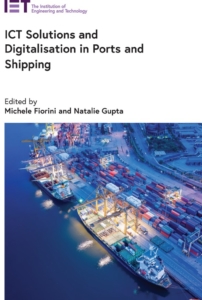Digitalization in Sea Ports and Shipping – Dr Michele Fiorini, Dr Natalie Gupta
‘ICT Solutions and Digitalisation in Ports and Shipping’, edited by Michele Fiorini and Natalie Gupta (IET 2020/2021)


The authors of this comprehensive book, ‘ICT Solutions and Digitalisation in Ports and Shipping’, edited by Michele Fiorini and Natalie Gupta (IET 2020/2021),
came from a wide variety of maritime institutions composed of eminent engineers, researchers and scientists in the global maritime arena.
Dr Michele Fiorini, Dr Natalie Gupta and other fellow writers have cumulative global experiences and expertise that, when combined, had resulted in an influential
book on ‘ICT Solutions and Digitalization in Ports and Shipping’. Indeed, an ‘A rate’ because my good friend Dr Michele Fiorini, the Chair of the Institute of Engineering and Technology (IET) Italy, is one of the prime movers of this book project. In 2009, we initially met at the International Conference on Marine Navigation and Safety of Sea Transportation (TRANSNAV) organised by the Faculty of Navigation of the Gdynia Maritime University in Gdynia, Poland. Our professional cooperation continues, constantly presenting papers in TRANSNAV and other publications regularly.
I have known Dr Michele Fiorini for more than 10 years as a dynamic respectable scholar, highly technical person who can transform difficult topics into
easy ones to make both maritime students and professionals understand instructions. The book is designed for researchers, chief technology officers, system architects, system and principal engineers, consultants and students who are or will be involved in information and communications technology (ICT) in maritime transport and ports, including software design, testing, performance analysis and validation.
Chairpersons, chief executives, commercial directors of ports, managing and operations directors somewhat involved in ports, port operations, port environments and traffic monitoring and management systems, authorities and business persons who aim to have a complete overview of ICTs and trade initiatives in seaports and port-toport traffic would also find this book very useful. No previous experience in ICT, systems engineering or port-logistics is required to appreciate the book. However, a generic knowledge of communication engineering and logistics would be beneficial.
The challenges in communications and information technology are both problematic and fascinating. People are working on them with enthusiasm, tenacity and
dedication to develop new analysis methods and provide unique solutions to keep up with the ever-changing threats. In this modern age of global interconnectivity and interdependence, it is necessary to offer ICT practitioners, professionals and students some state-of-the-art knowledge on the frontiers. The book provides an overview and analysis of the technologies suitable for different types of port operations and traffic monitoring and management systems. It may also fill a need and provide solutions through various options and alternative examples of many issues and concerns. I admire and salute the initiators and contributors for their joint effort and conceptualising this unique and vital book through the various well-thought chapters.
The broad topics covered by this book indicate the breadth of perspectives and insights, the scope of experiences and practices, and the functional integration of
theory and concrete examples brought together by the global authors who are experts on the subject of ICT in shipping, ports and international logistics. The
book is composed on the basis of high-quality, scholarly research that is structured in 13 chapters. The topics are comprehensive from global trade facilitation regulatory framework, maritime ports and cybersecurity, e-navigation and shore-based monitoring systems, maritime transportation along the Northern Sea Route, SMART shipping beyond e-navigation, maritime communications, a data-driven methodology for navigational Patterns of Life discovery, real-time information in ports with ITS technology, digital supply chain and port information modelling, hinterland users of ICT innovation in the MarSC: achieving cost-effective tools by integrating horizontal data, decarbonisation technologies in shipping and the question of transition fuels and shore-based navigation: from vessel traffic services to e-navigation Maritime Service Portfolio.
It can be surmised that the authors from all over the world had contributed in examining the application of ICT on the movement and clearance of freight at
seaports globally and evaluating the feasibility, use and impact of different types of ICTs on port and maritime navigation port-to-port.
The shipping and ports industry has been comparably slow in engaging with the concept of digitalisation relative to other modes of freight and passenger
transfer. This is partly due to the focus on freight rather than passengers (except ferries and cruise terminals) and market and ownership factors. The importance of
ICTs in the industry is, however, rapidly being recognised by many. Very advanced examples already exist in the number one ports by volumes such as Singapore,
Hamburg, Rotterdam and others. However, only 3% of the world’s ports are massive, with over 50 million tonnes of cargo throughput per year. Furthermore, over
90% are small or very small, with less than 5 million tonnes of cargo throughput annually. The implementations of ICT solutions and digitalisation result are the
determinants of investment decisions on the development of these emerging ports.
Students, teachers, port operators, shipping managers, policy-makers, project planners, professionals, researchers and scientists are encouraged to read this
exciting book on ‘ICT Solutions and Digitalisation in Ports and Shipping’ and be inspired to think, rethink and contribute their share for sustainable development in
ports and shipping. This book is a good step in that direction.
Prof. Angelica M. Baylon, Ph.D., MBGPH, MSBM, Ph.D. MBA, MS Chem, BS Chem, AFNI, MIMarEST, FDR, DFRIMM, SFRIEdr, RIIVPF, DFRIEdr, RIRF
Chairman Emeritus of PAEPI-Global, Fellow TRANSNAV, GMU, and NI Poland, Hon Sec, IMarEST Ph Branch, NI Ph Branch and Institute of Maritime
Management, RI Singapore, ERO Director, Maritime Academy of Asia and the Pacific – Philippines
